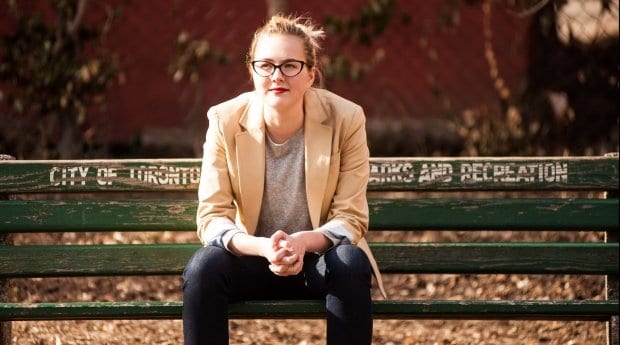Morgan Baskin wishes she had a cooler story to explain why she decided to run for mayor of Toronto.
“There really isn’t [one],” Baskin says. She adds that it would be nice if there was — apparently, it’s the most frequent question reporters ask her.
But the decision came naturally, she explains, as she began to become more interested in, and simultaneously more frustrated with, municipal politics. After a few years of mulling it over, she thought why shouldn’t she run for mayor?
That’s why, while her peers are attending their first ever frosh week around the corner at Ryerson University, she is now mired in preparations for the final weeks of a dramatic mayoral campaign.
Though widely considered a fringe candidate, Baskin is taking her candidacy seriously — she has no plans as of yet to drop out at the end to support another candidate.
And she’s more than held her own. She corrected Doug Ford at a debate on Sept 29 and has been attracting attention for her youth-centred campaign — Baskin was only 18 when she entered the mayoral race earlier in 2014 — which has included interviews in some unlikely outlets, like Forbes and Flare magazine.
“Rob Ford isn’t going to do an interview in Flare — no one is going to ask him who his fashion influences are,” she says. “My ability to transcend some of those spaces and places that are cosigned to politicians allows a dialogue with people who are younger or who are feeling disenfranchised.” It’s also given her a space to encourage young people to go out and vote, even if they can’t vote quite yet — she is frequently requested to speak at elementary schools.
The three pillars of her campaign are “digital, global and green,” chosen because they frame her platform around broad issues that she believes people can relate to. It comes in part from talking to friends who couldn’t name a politician aside from her — and Rob Ford — but still cared deeply about issues like transit and global warming.
She says things like the decision between subways and LRT should be left to the experts, while the city focuses on what can be done immediately. City staff could do more to help the developers behind many of the transit apps people use to learn when the next bus or streetcar is coming, for example.
She, like many others, was troubled by the mayor’s history of making homophobic and racist comments. “When you are representing people who are queer, who are Asian, who are immigrants, who live that day-to-day — when the . . . elected official representing your city, the place where you live, is saying awful things about you, that is completely awful.”
The issue is personal for Baskin. At an event in May, she revealed that she has two trans parents — one is S Bear Bergman, a writer who has contributed to Xtra. The pair are just as active in her life as her biological parents are, and she considers them an integral part of her family; she spends enough time at their house to warrant another toothbrush.
Though her family has certainly had an impact on her campaign (they also provide a lot of help on the campaign trail), she feels that, like many of her peers, having an untraditional family structure is just her normal. “You can have any combination of parents and many different numbers of parents or people who act like parents,” she says.
So what comes after the election? “I have no idea!” she says. She knows she wants to stay in the public service sector and eventually go to school for urban studies. Beyond that, she says she wants to nap — and not talk to another reporter for at least a few days.


 Why you can trust Xtra
Why you can trust Xtra


